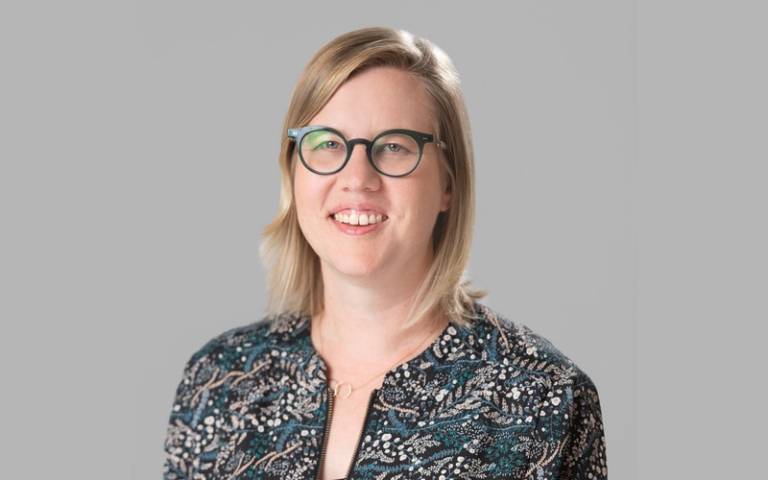Spotlight on... Lisa Vanhala
12 December 2023
This week we meet Lisa Vanhala, Professor at the Political Science Department and a member of UCL’s COP28 team. Lisa discusses her research into the governance of climate change loss and damage, the progress made at COP28, and the importance of real action beyond the conference.

What is your role and what does it involve?
I am a Professor in the Political Science Department and School of Public Policy. My role includes teaching on topics including climate policy and environmental politics, human rights and research methods. I am also a deputy head of department supporting colleagues in their career development. My main work over the last six years has involved leading a fantastic research team working on the politics of climate change loss and damage funded by an ERC Starting Grant. In February 2024 I am also excited to be stepping into the role of joint Pro-Vice-Provost for the Climate Crisis with Professor Mark Maslin. We are going to make a great team and I’m delighted at the opportunity to work with colleagues, professional staff and students from across UCL who are interested in climate change.
How long have you been at UCL and what was your previous role?
I joined UCL in 2012 after a British Academy post-doctoral fellowship at Oxford. I think UCL is an amazing place to study and conduct research on climate change and how to address it. As I get to know more and more experts from across the university and see the motivation of students interested in sustainability, I become ever more inspired.
Tell us about a project you are working on now which is top of your to-do list
I am currently completing a project on the politics and governance of climate change loss and damage. While we have a good understanding of what is required to reduce greenhouse gas emissions and the interventions available to adapt to the impacts of climate change, countries are only beginning to grapple with how to address, and “govern”, the losses resulting from climate change impacts. I’m currently completing a book, Governing the End: The Making of Climate Change Loss and Damage, which follows the history and politics of this area of governance within the UN Climate Change regime.
As I write this, I am travelling back from COP28. This year marked a major step forward on this issue with the operationalization of a new fund to address loss and damage. This is in many ways a significant achievement given how difficult the negotiations on this topic have been over the last decade. However, my book argues that we need to look beyond the headline-grabbing agreements at COPs to really start to understand whether international climate law commitments will become a reality.
What working achievement or initiative are you most proud of?
As part of the project on loss and damage, I’m also co-editing a book with Dr Elisa Calliari. It is the first book to trace how national-level policy makers are navigating the politics of climate change loss in their own countries. We worked with collaborators and early career researchers in Antigua and Barbuda, The Bahamas, Tuvalu, Bangladesh, Ethiopia, Peru and Chile to begin to tease out the kinds of issues those on the frontlines of climate change are grappling with from a policy perspective. Members of our project research team were due to undertake fieldwork – ethnographic observation and semi-structured interviews - in seven countries over the course of 2020 and 2021. Obviously the Covid-19 pandemic threw a spanner in the works. We had to find new ways of doing the outreach with policymakers across the developing countries which we were wanting to study and to conduct research interviews in. We began partnering with amazing collaborators across developing countries, like Dr Adelle Thomas in The Bahamas and Dr Selam Kidane Abede in Ethiopia, who connected us with early career researchers interested in helping us understand their local contexts and priorities. The resilience and creativity of the team was unparalleled. We learned so much from the process substantively about how countries are grappling with loss and damage. But I also took away many lessons about how fruitful and satisfying deep collaborative work can be. Really listening to and amplifying the voices of policymakers and scholars across the Global South in the academic literature is absolutely critical for addressing the knowledge injustices we see.
What is your favourite album, film and novel?
Miles Davis’s Kind of Blue. Le Fabuleux Destin d'Amélie Poulain. Surfacing by Margaret Atwood.
What is your favourite joke (pre-watershed)?
Getting mythology wrong is my Hercules ankle. (The joke is by Olaf Falafel at the 2023 Edinburgh Fringe Festival).
Who would be your dream dinner guests?
Mary Robinson (former President of Ireland and Chair of the Elders), Sanna Marin (Former Prime Minister of Finland), Hillary Clinton (former U.S. Secretary of State), Jane Garvey (former host of BBC Women’s Hour) and my nine year old son Sam.
What advice would you give your younger self?
There is so much I would say to my younger self! But then again, the mistakes I made and the trials and tribulations I faced have taught me so much and made me who I am today.
What would it surprise people to know about you?
I competed nationally as a rhythmic gymnast in Canada where I grew up.
What is your favourite place?
Algonquin Provincial Park in Ontario, Canada. I spent many happy summers hiking and canoeing on the beautiful lakes as a child and now have the privilege of seeing my son discover the same delights.
 Close
Close

